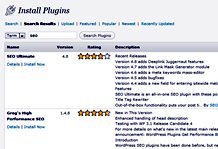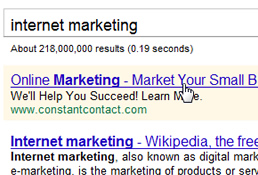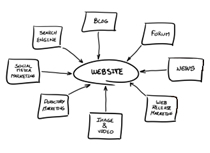Posts Tagged ‘site’
Description of ‘site’ Tag:
Friday, February 25th, 2011
 The time that it takes for a website to load is commonly referred to as site speed. Site speed is measured from the moment a link is accessed or after a URL is entered into the browser search. Depending on the type of website or how heavy its content is, a site’s speed is typically between 2-5 seconds. At any rate below 2 seconds a website’s speed is thought to be excellent. A speed between 2-5 seconds might not be the fastest, however it is perfectly acceptable. Anything taking 5 seconds to load can annoy or turn away visitors and be less popular with search engines. The time that it takes for a website to load is commonly referred to as site speed. Site speed is measured from the moment a link is accessed or after a URL is entered into the browser search. Depending on the type of website or how heavy its content is, a site’s speed is typically between 2-5 seconds. At any rate below 2 seconds a website’s speed is thought to be excellent. A speed between 2-5 seconds might not be the fastest, however it is perfectly acceptable. Anything taking 5 seconds to load can annoy or turn away visitors and be less popular with search engines.
A site’s speed is only one of the many factors that search engines utilize in their website ranking algorithm. Search engines employ ranking algorithms in order to assign a page rank to a website and to ensure that a search returns with the best and most relevant results. The following are options that site owners can apply to their sites in order to reduce the time it takes for their website to load. Reducing a sites load time or increasing a sites speed will generate better customer responses as well as appeal more to search ranking algorithms.
Before attempting the following suggestions you should try out these free tools to see how your site measures up. Pingdom Load Time Test is an easy tool that allows you to assess the speed or your website. The program GTmtrix analyzes site speed, provides a grade for your website and generates a list of potential problems that they recommend that you fix. These are just two of the many free tools available to measure the performance of your website. Upon completion of these tests, if you are unsatisfied with your websites performance we recommend implementing the following changes.
Compress your Website:
Website data compression converts all of a website’s text elements that are written in HTML, CSS, and JavaScript into bundles. After the compression process is complete websites no longer have to send and recognize each individual file.… Read the rest
Tags: search, search engine, site, speed, website
Posted in Search Engine Optimization SEO | 1 Comment »
Friday, February 18th, 2011
 WordPress is a web-based software that allows users to create and manage websites and blogs. The open source structure enables people from around the world to contribute to and maintain their WordPress website whether on WordPress’ web server or installed on their own web server. Although WordPress initially began as a blog tool it has developed into something so much more. By utilizing plug-ins, widgets, and themes users have the opportunity to fully customize their experience. A plug-in is software that can be added to existing software, like WordPress, which adds a new specific capability to the larger software application. For a full list of WordPress product features visit WordPress Product Features. WordPress is a web-based software that allows users to create and manage websites and blogs. The open source structure enables people from around the world to contribute to and maintain their WordPress website whether on WordPress’ web server or installed on their own web server. Although WordPress initially began as a blog tool it has developed into something so much more. By utilizing plug-ins, widgets, and themes users have the opportunity to fully customize their experience. A plug-in is software that can be added to existing software, like WordPress, which adds a new specific capability to the larger software application. For a full list of WordPress product features visit WordPress Product Features.
There are over thirteen thousand plug-ins available for the WordPress software making it extremely easy to tailor it to your specific uses. The following are some useful SEO plug-ins that the WordPress open source community has provided.
All-in-one SEO plug-ins such as WordPress SEO and SEO Scribe are designed to perform overall multiple SEO tasks that include optimizing content faster, providing great keywords, maintaining reader engagement, constructing quality links and increasing traffic! Most of the all in one SEO plug-ins operate similarly and perform similar functions. The following are among the most utilized all-in-one SEO WordPress plug-ins:
Below is a list of related, individual plug-ins that can be helpful in improving your blog or website’s Search Engine Optimization and enhancing Social Media Marketing:
AddToAny Share/Bookmark/Email:
AddToAny creates a customizable panel that showcases social networking sites. It makes it extremely easy and convenient for a visitor to submit to any social networking sites. The share menu organizes the social media sites according to most visited.
SEO Friendly Images:
The SEO Friendly Images WordPress plug-in automatically adds the “ALT” and “title” attributes to any images on your
… Read the rest
Tags: Blog Hints, link, plug, plugins, search, seo, site, title, Wordpress, wordpress plug ins
Posted in Blog Hints, Internet Marketing, Search Engine Optimization SEO, WordPress | No Comments »
Friday, February 11th, 2011
Advertising in any form has the goal to attract more customers and more revenue. Like advertising on television or in print ads, the world of online advertising shares the same purpose.

Basically online advertising sets out to attract customers by using the Internet, with websites and search engines as their medium. The Pay per Click (PPC) advertising model is where a host is compensated each time the promoter’s advertisement is clicked. The Cost per Click (CPC) is the actual amount that is paid out by the advertiser to either the search engine or website owner for each click that occurs. Websites that utilize this type of advertising will often present an advertisement or text link, when there is a common term between the websites keyword query and the advertiser’s keyword list. In other words, when a website has related information to the advertiser, a link will be displayed either on the side or above or in line with the website’s original content depending on the website. There are a couple different variations of pay per click online advertising which include Cost per Mille (CPM ), Cost per Visitor (CPV), Cost per Lead (CPL), Cost per Click (CPC), and Cost per Action (CPA).
When performing a search at a search engine you may have noticed that the results return with sponsored links. The sponsored links appear at the top or sides and the advertisers pay to be in these sponsored links sections. Each time a visitor accesses the site through this link, money is paid to the search engine through a prepaid account with that search engine. In order to achieve a sponsored link location websites, advertisers place bids for the amount of money they are prepared to pay per click. Since there are multiple link positions available, the highest bid is placed at the top, the next highest is placed second and so on. In addition to the websites being able to determine how much they pay per click they can also specify how much they… Read the rest
Tags: advertising, cost, engine, money, search, service, site, website
Posted in Internet Marketing, Search Engine Optimization SEO | No Comments »
Thursday, August 5th, 2010
 Hey, Josh here from the InternetBeacon. Hey, Josh here from the InternetBeacon.
More info on SEO, check out our SEO Answers page, our SEO Glossary, and our blog posts on SEO.
Today we examine one of the classic conundrums when it comes to web design: using advertising to grow and earn from you website while not turning your page into a seizure-inducing catastrophe. Fear not, this can be done. In fact, lots of people have done this already. Here are a few tips.
Carefully Examine Potential Ads
Unless you really didn’t look at the agreement before posting ads on your site, you should have had a chance to look at some ads that the company runs. If they are all “Click Here! You’re a Winner!” ads with strobe effects and smiley faces, you will probably want to stay away from them. Be cautious, as your ads will affect how people perceive your site.
Take it Slow
Placing advertisements on your site is not an “all or nothing” deal. You can start slowly and examine how different types of ads work. Google, for example, offers very simple, low-impact ads that will give you a taste of how the ad game works in relation to your site.
Match Ads to Content
Some ad networks will do this for you. You tell them what your site is about and some demographic info and they provide you with ads. However, some may not do this and so you need to make sure the ads on your page make sense. If you are writing a blog about home remedies and your page’s ads are about savings on video games, odds are they won’t match your target market.
-Josh
Internet Beacon

Tags: ads, Blog Hints, seo, site
Posted in Internet Marketing, Web Development | No Comments »
Thursday, June 3rd, 2010
 Howdy, Josh here from the Internet Beacon. We´re a Search Engine Optimization (SEO) firm located in Reisterstown, Maryland. What we do, SEO, is a subcategory of Internet Marketing. Similar to traditional advertising, SEO is all about getting your Brand out there. In this case, we´re working to get your website in front of customers through search engines like Google, Yahoo, and Bing. For more quick, useful information, check out our SEO Answers page, our SEO Glossary, and our blog posts on SEO. Howdy, Josh here from the Internet Beacon. We´re a Search Engine Optimization (SEO) firm located in Reisterstown, Maryland. What we do, SEO, is a subcategory of Internet Marketing. Similar to traditional advertising, SEO is all about getting your Brand out there. In this case, we´re working to get your website in front of customers through search engines like Google, Yahoo, and Bing. For more quick, useful information, check out our SEO Answers page, our SEO Glossary, and our blog posts on SEO.
You´ve got a website. Congratulations! Now it´s time to put some content on there. You know that the more you have, the better your site will do online. This is a mixture of Google´s PageRank system, pages indexed by sites like Yahoo! and Alexa, as well as the actual content on your page. This is where a lot of people are tempted to build giant sites that are really just the same page or two duplicated over and over again. This is a terrible idea.
There are many reasons why you should not simply bombard a web server with the same pages. First, no one is going to like your website. I know that search engines are important, but they are not the be-all/end-all of the Internet. The fact of the matter is, PEOPLE are going to look at your website. If they hate it because it´s 1,000 page of the same thing, no one will ever come back. In fact, they´ll likely tell their friends to steer clear of your site.
Second, search engines are not stupid. Think about it. You´re relying on software to make your website more popular; do you think they don´t know what´s going on? I can answer that: they do. Google, like all search engines, searches the text on your page. Therefore, they have checks in place to make sure that your content is not duplicated. Avoid duplication when building your site. The big guys know what you´re up to.
That´s all for this week. Check back again next week for more tips on web development and SEO.
-Josh
Internet Beacon
SEO Maryland

Tags: content, engines, Google, internet, marketing, page, search, search engines, seo, site, website
Posted in Internet Marketing, Search Engine Optimization SEO | No Comments »
Friday, March 5th, 2010

Welcome to the Internet Beacon blog. My name is Josh. The Internet Beacon is a Search Engine Optimization (SEO) firm located in Finksburg, MD. SEO is a form of Internet Marketing. What we do is work with you to get your website among the top ranked results for select keywords related to your business. For a more detailed explanation, check out our SEO Answers page and our blog post on SEO.
Today I’d like to talk about avoiding SEO companies that promise the world. What I mean by this is someone who will tell you that they can get your website on the top ten results on Google inside of a week or two; or that they know the “secret” of SEO. The truth is SEO takes a lot of time and work if done properly. If not, you may have just thrown hundreds of dollars away. Here are three things to watch out for when choosing an SEO company.
1) The Promise
You’ve met with the young, fashionable director of SEO at “Marketing, Inc Corporation International” about doing SEO for your small business. He threw around a lot of cool buzzwords and told you that, for a small fee, your site will be the most popular location on the Internet. For the most part, this is obviously an attempt to get your money. Let me say this clearly, it is not possible to become, overnight, the hottest thing on the Internet. Thank this guy for his time and move on.
2) The Secret
The website you’ve discovered has finally “found the secret to SEO”. They can’t tell you how, but they have mastered this process. All they need is your money and they will make your site an Internet phenomenon. This is a lie. There is no secret to SEO. It is a process like anything else. Good SEO takes time and, only after that time, will results begin to surface.
3) The Quick Fix (That Lasts!)
Some SEO providers will tell you that all you need is their one time service to meet your SEO… Read the rest
Tags: Blog Hints, internet, search engine optimization, seo, site, time, website
Posted in Search Engine Optimization SEO | No Comments »
|
![]() The time that it takes for a website to load is commonly referred to as site speed. Site speed is measured from the moment a link is accessed or after a URL is entered into the browser search. Depending on the type of website or how heavy its content is, a site’s speed is typically between 2-5 seconds. At any rate below 2 seconds a website’s speed is thought to be excellent. A speed between 2-5 seconds might not be the fastest, however it is perfectly acceptable. Anything taking 5 seconds to load can annoy or turn away visitors and be less popular with search engines.
The time that it takes for a website to load is commonly referred to as site speed. Site speed is measured from the moment a link is accessed or after a URL is entered into the browser search. Depending on the type of website or how heavy its content is, a site’s speed is typically between 2-5 seconds. At any rate below 2 seconds a website’s speed is thought to be excellent. A speed between 2-5 seconds might not be the fastest, however it is perfectly acceptable. Anything taking 5 seconds to load can annoy or turn away visitors and be less popular with search engines.